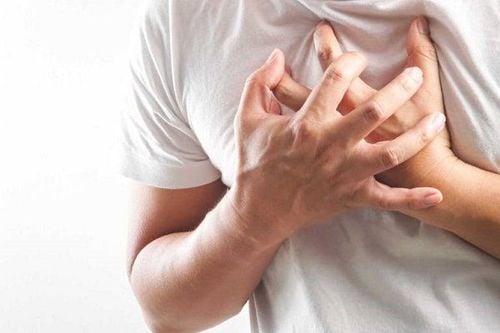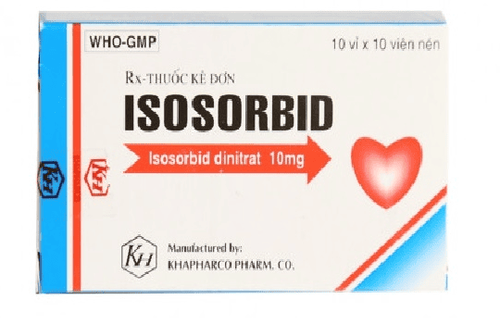This is an automatically translated article.
Waking up tired, short of breath can be a sign of a serious health problem. Many people assume that this condition is due to sleep apnea, but in fact gasping when you wake up can have many causes. Some causes are temporary and benign, while others are more serious.
1. Sleep apnea makes you gasp when you wake up
Sleep apnea (OSA) is a nighttime breathing disorder that occurs when the tongue and other tissues in the mouth fall back and block the airways, making it difficult to breathe. Each of these episodes often stops breathing for up to 1 minute or more and can repeat hundreds of times per night. Some people may suddenly wake up short of breath or choke. Other symptoms associated with OSA include:Excessive daytime fatigue; Loud snoring ; Morning headache; High Blood Pressure ; Mood swings; Difficulty concentrating during the day.
2. Anxiety and panic attacks at night
Some psychological instability can trigger breathing problems at night. There are many patients who share that they do not snore, but wake up gasping at night. After ruling out sleep apnea and other potential physiological causes, the experts found that these patients were most likely to gasp during sleep due to excessive anxiety or psychological instability at night. night.
Manifestations of nocturnal panic attacks are pounding heart, sweating, shortness of breath, panic attacks accompanied by fear and anxiety. These patients are also more likely to have a history of insomnia. Other symptoms include:
Feeling faint or dizzy; Chills, sweating; Chest tightness, difficulty breathing; Feeling out of control; Worry or fear of something that is about to happen.

Cơn hoảng sợ về đêm có thể khiến bạn thở hổn hển khi thức dậy
3. Postnasal drip syndrome makes you wake up tired
Post Nasal Drip is also a common cause of gasping when waking up at night, especially in people with severe nasal congestion.
When a person with a stuffy nose lies down to sleep, secretions can flow from the nose down the nasopharynx, into the pharynx, causing choking, coughing reflexes, and gasping. People who wake up short of breath due to postnasal drip often say they feel like they're suffocating, and have symptoms like a sore throat, a bad taste in their mouth, or a sinus headache.
4. Caused by Acid Reflux
Acid reflux can cause acid in the stomach to back up into the esophagus. This condition is also known as gastroesophageal reflux disease (GERD). Sometimes acid moves far enough up the larynx or throat to lead to laryngeal reflux (LPR). This can cause the person to choke, cough, and gasp when they wake up. Other common symptoms of acid reflux include:
heartburn ; Erosion of tooth enamel ; Bad breath ; Chronic sore throat.
5. Heart failure makes you wake up tired, short of breath
A common heart problem is heart failure, which can also cause you to wake up tired and short of breath. This condition occurs when the heart cannot pump enough blood to the organs in the body, resulting in a shortage of oxygen.
Congestive heart failure also causes extra fluid to build up in or around the lungs, leading to congestion and difficulty breathing. While symptoms most commonly occur during strenuous exercise, it can also occur when the person is lying down and resting. Other symptoms may include:
Swollen feet; Chest tightness; Comatose; Abdominal tightness; Stomach and bowel problems.

Suy tim sung huyết khiến bạn ngủ dậy bị mệt
6. Pulmonary edema makes it more difficult for the patient to breathe
Pulmonary edema occurs when excess fluid builds up in the empty spaces and tissues in the lungs. This will make it harder for the patient to breathe. Pulmonary edema may develop slowly over time, but can also develop suddenly. Some people may experience gasping when they wake up feeling like they're suffocating or drowning. Acute pulmonary edema is a medical emergency. Other symptoms that the sick person may experience include:
Shortness of breath; Wheeze; Sudden anxiety or restlessness; Fast and irregular heartbeat; Chest tightness; Coughing up frothy, possibly bloody sputum. In general, gasping upon waking is an alarming but not uncommon condition. If you pay attention to treat each cause and gradually reduce the symptoms, the patient will be able to sleep well again. However, if the disease worsens, the patient has problems such as difficulty breathing, severe chest pain, loss of consciousness, it is necessary to seek medical help immediately.
Please dial HOTLINE for more information or register for an appointment HERE. Download MyVinmec app to make appointments faster and to manage your bookings easily.
References: goldcoastimplantspecialist.com.au, healthline.com, webmd.com












